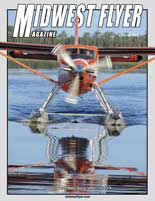by Kyle Lewis
Manager, Great Lakes Region
Aircraft Owners & Pilots Association
Published in Midwest Flyer – August/September 2017 issue
The AOPA Great Lakes Regional Manager post had been vacant for nearly a year before I filled the position this spring, and I am getting up to speed on a number of legislative and airport advocacy issues. These range from fighting airport closures, funding problems, sales tax exemptions, and state aviation budgeting shortfalls. So far, I have been to a few events in the region, including the “Great Minnesota Aviation Gathering” (GMAG) held at Anoka County-Blaine Airport in the Twin Cities in April, and the “Minnesota Seaplane Pilots Association (MSPA) Safety Seminar” at Maddens on Gull Lake in Brainerd, Minnesota in May.
Both events were well produced and focused on safety training. Andy Miller, AOPA Ambassador for the “You Can Fly” initiative, presented the Rusty Pilots Seminar at GMAG and had a very positive response. If you have not yet attended a Rusty Pilots Seminar, rusty pilot or not, I highly encourage you to (free for AOPA members). Andy is excited and passionate about flying, getting pilots involved, and creating a positive learning environment. GMAG was held at Greg Herrick’s Golden Wings Aviation Museum, which is an amazing venue, full of golden age aircraft (www.goldenwingsmuseum.com).
The MSPA weekend at Madden’s was well attended, even if the weather felt more like October than May. There were 22 aircraft at Madden’s Seaplane Base on Gull Lake, 21 aircraft at East Gull Lake Airport (9Y2), and 185 people attended the banquet featuring AOPA President Mark Baker, who spoke of the many new initiatives AOPA is currently engaged in.
The take home point of Mark’s speech is GA is looking good! For all the negatives encountered over recent years, AOPA is leading the fight to making GA as strong as ever. BasicMed and Part 23 rewriting are just a couple of the landmark wins recently. AOPA’s “You Can Fly” program is already making an impact on the number of active pilots in a very positive way. Mark is an avid floatplane pilot and was right at home among the attendees. The entire experience has motivated me to get my seaplane rating as soon as possible.
Other presentations at the MSPA Seminar ranged from FAA compliance philosophy, Minnesota Department of Natural Resources Wildlife Management (did you know the DNR drops fish from a floatplane to stock lakes!), and risk management, presented by well-known warbird pilot and self-proclaimed low-time floatplane pilot, Doug Rozendaal of Mason City, Iowa.
Switching gears, on the legislative front, in Michigan, there are currently two House Bills (4350/4351) that will create a sales tax exemption for the parts and repair of GA aircraft registered in Michigan. This will affect nearly 6,000 GA aircraft in the state. Currently, the sales tax is waived for out-of-state registered aircraft, leaving in-state owners the option of going to Ohio, Wisconsin or Indiana to purchase parts or seek maintenance sales tax free. By passing this law, Michigan repair shops will get back into the business of GA maintenance that is currently taking a hit. Hopefully, by the time this article is published, the legislation will be signed into law by the governor.
In Ohio, the bi-annual appropriations budget is in the state senate, and has a comparable aviation budget to the previous years’ budget. Nearly $6 million will be slated to go into the state grant assurance program. Ohio is now matching 5% of the local required match for FAA grants, leaving only 5% for local municipalities.
Nationally, President Trump has taken a stand on ATC privatization, and it is not what is in the best interest of the GA community. You will hear more and more on this issue, but AOPA is against any policy that would create user fees for general aviation. Of course, AOPA is in favor of making the ATC system more efficient and robust (NextGen), building upon what we have. The current ATC system in the United States is the safest and most efficient in the world. Stay informed on the issue and help educate your local pilot community and elected officials.
Another highlight of my job here at AOPA includes interacting with “Airport Support Network” (ASN) volunteers. If you are not familiar with the program, AOPA maintains a set of volunteers, one per public-use airport, to be the eyes and ears of AOPA. As I tell my volunteers, this is an avenue in which to highlight the good and notify AOPA of any questionable operational restrictions or circumstances. AOPA ASN volunteers help educate their community and local governing bodies on airport operations and the value of the airport. In the Great Lakes Region, there are currently 459 public-use airports that do not have an AOPA ASN volunteer. To be a volunteer, you need to be a current AOPA member. Visit this website for more information: https://www.aopa.org/advocacy/airports-and-airspace/airport-advocacy/asn/about-the-airport-support-network
In my short time at AOPA, so far, I have encountered numerous pilots, airport and FBO managers, aviation enthusiasts and industry coworkers who have been more than welcoming. It is very humbling to be able to work in General Aviation and experience it firsthand! I look forward to visiting every corner of the states I represent and meeting everyone that makes General Aviation one of our greatest freedoms and privileges in these United States. Please feel free to contact me at kyle.lewis@aopa.org










